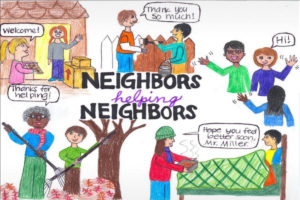I became a Christian when was twenty-six years old. This is when I learned that I could have a personal relationship with God through Jesus Christ. I had never heard this before. That may sound incredible to you, especially if you grew up in church. It also may be hard to believe that my experience is not all that unusual. Most people I’ve known never heard that having a personal relationship with our Living God is possible.
I questioned this. It seemed crazy to me. But the possibility of it actually being true also excited me. I wanted to know more.
I was in my last semester of college when, Gaylin, a fellow student, shared this with me. She was different. She had a peace about her that I’d never seen before. I asked her one day, “Gaylin, There’s something different about you. What is it?” This is when she told me, “I have a personal relationship with God through Jesus Christ.”
At the time I was not happy or at peace. I was searching for answers; for meaning, for happiness. About six month later, after asking Gaylin hundreds of questions and attending church with her and reading the Scriptures, I finally received Jesus.
I believe there are thousands of people like me living in our neighborhoods and working and going to school all around us today who’ve never heard, unbelievably as it may seem, that it’s possible for them too to have a personal relationship with God trough Jesus Christ.
I don’t believe that most people are hostile to us or to the Gospel. I believe that they may have just not seen Christians living differently around them or have never asked those they have seen, “What is it about you? Why are you so different?” I think this may be because they don’t have personal relationships with us that would cause them to ask why we are so different.
Tim Keller once said, “We can’t stay in safe places (as Christians). We’ve got to get close to the problem rather than serving at a distance.” By close to the problem he meant, relationally close. We’ve got to learn about others, their lives and we need to get close in order to share our lives with them to earn their trust and get to know them and for them to get to know us.
Bryan Stevenson, a Christian social justice activist and law professor at New York University School of Law, and the founder and executive director of the Equal Justice Initiative, has spent his life getting close to the problem.
He works to bring legal representation to the poor, juvenile, mentally ill, and minority prisoners (mainly) in the South. He talks about the essential action of being PROXIMATE – of getting close to the problem.
He says, “There is power in proximity. When you get proximate to people who are suffering, you can wrap your arms around them, and you will be empowered with the belief that you can change the world. This will allow you to change the world.”
Gaylin and I were proximate; we spent time together working on student projects and got to know one another in the process. And as we did, I observed that little light of divine life in her that caused me to ask, “What is it that’s different about you?” She was’t just a fellow student who happened to be a Christian. She was someone I got to know well enough to ask why she was different.
Getting proximate means to intentionally seek personal relationships with our neighbors.
Do your outreach ministry actions in your neighborhood …
- Encourage building personal relationships or are they merely transactional – just giving them things we perceive they need?
- Do they result in Making Disciples that you are disciplining over time?
- Are you actually out in your neighborhood getting close to your neighbors?
The Temple of Peace, Wickham Ave. in Newport News, made the commitment to get out from the relative safety of their church to get to know their neighbors in their neighborhood.
They started by “Praying the Perimeter.” Over time, as they prayed as a church together for the neighborhood, God gave them a deep love for their neighbors and some ideas for how to connect with them. Over time, the neighbors come out of their homes, wondering what was happening and asked for prayer for themselves and their family members. Over time they built caring relationships, albeit messy at times, for the needs of the people were often messy.
This encouraged their neighbors and, as Bryan Stevenson says, they wrapped their arms around one another and were empowered with the belief that they, together, could change their world…. their neighborhood.
There really is GREAT POWER in PROXIMITY!




